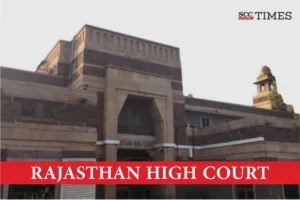Rajasthan High Court: In a writ petition challenging the method of distribution of marks for deleted questions in the Junior Accountant and Tehsil Revenue Accountant examination conducted by the Rajasthan Staff Selection Board, a single-judge bench of Vinit Kumar Mathur, J., held that redistribution of marks for deleted exam questions within the same subject is fair and impartial method, thereby preserving the exam structure and maintaining parity among candidates.
In the instant matter, the petitioners, being eligible candidates for the post of Junior Accountant and Tehsil Revenue Accountant, filed applications in response to an advertisement dated 20-06-2023 issued by the Rajasthan Staff Selection Board. The exam scheme included two papers, each carrying 450 marks. A minimum of 35% in each paper and 40% aggregate was required, with 5% relaxation for SC/ST candidates. After the exam, certain questions were deleted due to errors or confusion. The marks for these deleted questions were redistributed among the remaining questions in the same subject.
The petitioners challenged this method of redistribution and argued that the deleted questions should either not be counted in the total marks or bonus marks should be awarded to all candidates. The petitioners contended that redistributing the marks of deleted questions within the same subject was unfair. The petitioners relied on precedents, including Jitendra Kumar Jhalani v. State of Rajasthan1 and Ravi Kumar Khandelwal v. State of Rajasthan, 2015 SCC OnLine Raj 6180 where changes to exam rules after the exam was conducted were not allowed.
However, the respondents argued that the method of redistributing marks for deleted questions within the same subject maintained parity. It was contended that since the exam was divided into subject-wise questions, redistributing the deleted question’s marks within the same subject preserved the exam’s structure. The respondents cited Vinod Kumar v. State of Rajasthan, 2020 SCC OnLine Raj 2282 and Narendra Singh Rathore v. Rajasthan Public Service Commission, 2017 SCC OnLine Raj 3887, where similar methods were upheld by the court.
The Court rejected the petitioners’ argument that the respondents had changed the rules after the selection process began, stating that the method adopted was fair, impartial, and did not prejudice the petitioners. The Court dismissed the petitioners’ reliance on mentioned precedents, as the facts of the cases are distinguishable.
The Court referred to Vinod Kumar (Supra) and noted that redistributing marks subject-wise ensures fairness and avoids altering the weightage of other subjects. The Court reasoned that distributing marks subject-wise, as opposed to across the entire exam, preserved the balance of the examination’s subject weightage. The Court stated that deleting questions and redistributing marks within the same subject ensured that candidates were fairly assessed based on their knowledge of that subject. The Court asserted that the system used ensured fairness, as candidates would not be penalised for the deletion of questions, and therefore, no discrimination occurred.
The Court stated that “if the procedure adopted by the respondents is fair and impartial and because of that even if some candidates are adversely affected, the Court may refrain from intervening for larger benefit of the candidates, who have participated in the selection process.” The Court upheld the method of redistributing the marks of deleted questions within the same subject. The Court dismissed the writ petition and disposed of all pending applications.
[Surendra Choudhary v. Rajasthan Staff Selection Board, Jaipur, 2024 SCC OnLine Raj 2814, Decided on 11-09-2024]
Advocates who appeared in this case :
Mr. Vivek Firoda and Mr. Jayram Saran, Counsel for the Petitioners
Mr. Manish Patel, AAG, Mr. Rakesh Arora and Mr. Naresh Singh, Counsel for the Respondents
1. S.B. Civil Writ Petition No.16800/2012.

